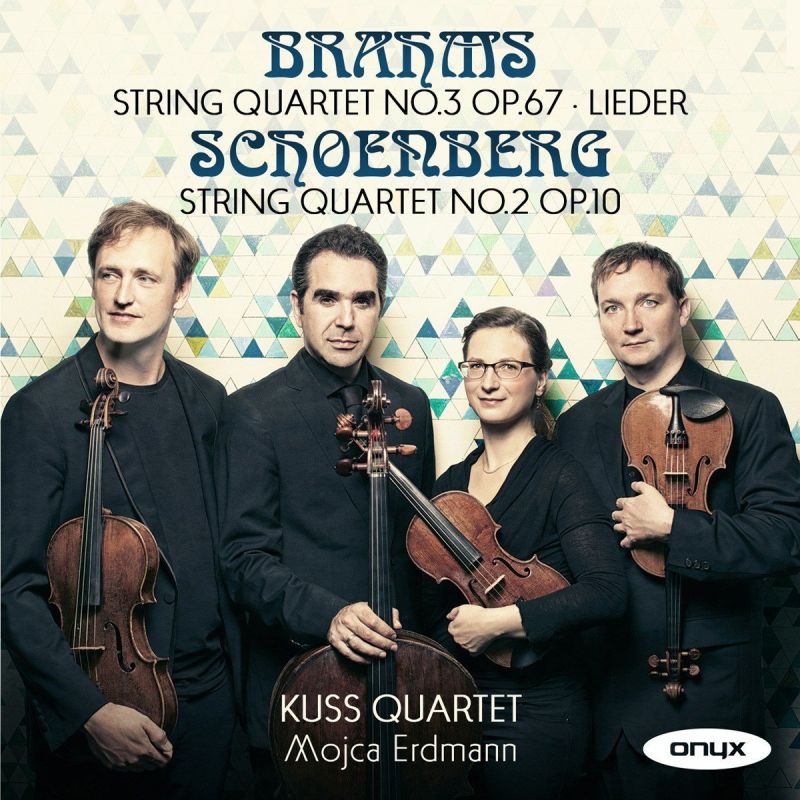BRAHMS; SCHOENBERG String Quartets
View record and artist detailsRecord and Artist Details
Composer or Director: Johannes Brahms, Arnold Schoenberg
Genre:
Chamber
Label: Onyx
Magazine Review Date: 01/2017
Media Format: CD or Download
Media Runtime: 73
Mastering:
DDD
Catalogue Number: ONYX4166

Tracks:
| Composition | Artist Credit |
|---|---|
| String Quartet No. 3 |
Johannes Brahms, Composer
Johannes Brahms, Composer Kuss Quartet |
| String Quartet No. 2 |
Arnold Schoenberg, Composer
Arnold Schoenberg, Composer Kuss Quartet |
| (5) Lieder, Movement: No. 1, Wie Melodien zieht es mir (wds. Groth) |
Johannes Brahms, Composer
Johannes Brahms, Composer Kuss Quartet Mojca Erdmann, Soprano |
| (6) Lieder, Movement: No. 1, Sommerabend (wds. Heine) |
Johannes Brahms, Composer
Johannes Brahms, Composer Kuss Quartet Mojca Erdmann, Soprano |
| (6) Lieder, Movement: No. 2, Mondenschein (wds. Heine) |
Johannes Brahms, Composer
Johannes Brahms, Composer Kuss Quartet Mojca Erdmann, Soprano |
Author: Peter Quantrill
Even so, this approach works in context. The rustic Scherzo is effectively staged as a male-female dialogue on the verge of neurasthenia, the trio haunted and hesitant, as if taking place in a forest clearing halfway between the poor unfortunate in Erwartung and the drowning corpse of Wozzeck’s Marie.
Thus we are prepared, as if by a chapter in Style and Idea, for Schoenberg’s journey to the precipice of tonality and back again in his Second Quartet. From the composer-approved Kolisch Quartet onwards, ensembles generally played this music with the tonal opulence it deserves. Because the LaSalle Quartet could play Ligeti and Lutosπawski for breakfast did not mean they would eschew the full Romantic apparatus of legato and portamento when Schoenberg himself demands it, which is frequently. Only in the last decade or two have historically informed approaches to Haydn and Mozart begun to problematise Schoenberg, paradoxically making him a new and disturbing figure all over again. The composer would have seen the irony.
In this regard, the sound-body of the Kuss is fuller and healthier than recent accounts of the Schoenberg from the Diotima and Asasello quartets, tonally comparable to the Leipzig Quartet though with a narrower vibrato. They impart to the opening movements a persuasive sense of the composer wrestling with his material, struggling to bend it into Brahmsian shapes until the music pulls him where he dared not go. Soprano Mojca Erdmann is on commanding form and well placed within the body of the quartet as a fifth voice. Her arrival brings a welcome additional urgency; the most heartfelt, full-blooded playing on the disc is reserved for the coda of ‘Litanei’, as the key turns in the door to the finale’s ‘other planet’. I am still waiting for an Emerson/Fleming account after their superb disc of Berg and Wellesz (Decca, 10/15), but the Kuss Quartet’s unique coupling marks them out as an ensemble to pay attention to.
Discover the world's largest classical music catalogue with Presto Music.

Gramophone Digital Club
- Digital Edition
- Digital Archive
- Reviews Database
- Full website access
From £8.75 / month
Subscribe
Gramophone Full Club
- Print Edition
- Digital Edition
- Digital Archive
- Reviews Database
- Full website access
From £11.00 / month
Subscribe
If you are a library, university or other organisation that would be interested in an institutional subscription to Gramophone please click here for further information.




